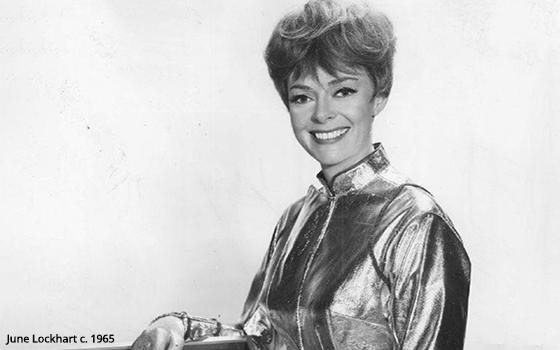
"A generation lost in space”
is how Don McLean referred to the youth of the 1960s in his song “American Pie,” but he may not have been referring solely to the fanciful sci-fi series “Lost in Space.”
The show comes to mind following the news last week that June Lockhart, famed for playing space mom Maureen Robinson on “Lost in Space” (1965-68, CBS), had
died at the age of 100.
Although her “home” was a marooned spaceship on an unknown planet, she played the role in the manner of a stay-at-home
mom (once known as a housewife).
A publicity photo I saw the other day had mom Maureen actually toting a laundry basket on the sandy ground outside the
saucer-shaped spacecraft.
advertisement
advertisement
Earlier, she played a mom on “Lassie” for six years (1958-64). The two shows established her as one of TV’s
best-known moms in an era when there were many of them.
It was the era of only three networks -- which for all intents and purposes meant that the entire
nation’s TV audience was divided into thirds, not thousands as it is today in a very different television era.
The 1950s and 1960s were the age of the
Baby Boomer, and it is that aging group for whom the death of a one-time TV mom from such a long time ago would have any significance.
In fact, here is the
point in the TV Blog where I explain what “Lassie” and “Lost in Space” were. Why? Because the world is now full of people who have never heard of them, which is a
concept that is difficult for those who grew up in the 1950s and ’60s to grasp.
“Lassie” was a show about a resourceful collie and her
adventures with a bright, energetic boy.
“Lost in Space” was about a family named Robinson who were sent far into
space on a mission of exploration, and then crash-landed onto a remote planet where they became stranded.
At age 100, June Lockhart outlived many of the Baby
Boomers who grew up with her. She was also one of the last of her generation of TV stars from the Baby Boom era.
There was a time, now decades ago, when
aging Baby Boomers were not so aged, and one of the things many of them enjoyed doing was going to various events to meet the stars of their childhoods and perhaps get their autographs.
June Lockhart was one of them, but there were many others. In 1994, I caught up with Fess Parker, then 64, who became an icon after starring in the title
role of “Davy Crockett” in the 1950s.
This show captured the imaginations of millions of little boys whose parents bought them coonskin
caps.
And yet, the show was only five one-hour episodes long. Such was the power of network television in 1954-55.
On that September Saturday in 1994, Fess Parker was meeting fans at a wine store in midtown Manhattan to promote the wine he was producing at his vineyard in Santa Barbara,
California.
His fans -- once boys and now middle-aged men -- were thrilled to be in the presence of Davy Crockett, and some of them even wore coonskin caps
and fringed “buckskin” jackets.
“He was an inspiration to me,” said one of them, a 47-year-old attorney from Great Neck, Long
Island.
“It was a nice turnout,” Parker told me after donning his own coonskin cap and buckskin
jacket to pose for pictures with about 200 fans who lined up outside the store on Madison Avenue.
So great
was their affection for their childhood TV hero that they bought about $2,000 worth of his wine.
Another TV
star from the 1960s who also wore his hat whenever he appeared at fan events was Bob Denver, who played the title role in “Gilligan’s Island.”
He brought
one of his famous sailor caps when I met him for an interview in 1993, in a conference room of the publishing company that had just released his memoir.
He did not wear the hat for our chat, but he marveled at its importance to fans whenever they saw it.
“I love to hear people say, ‘Is that really one of the hats?’ They are almost in awe,” he said.
Fess
Parker was 85 when he died in 2010. Bob Denver was just 70 when he died in 2005.
Their era of television is long past, replaced by a TV universe that bears almost no resemblance to the
one they knew.